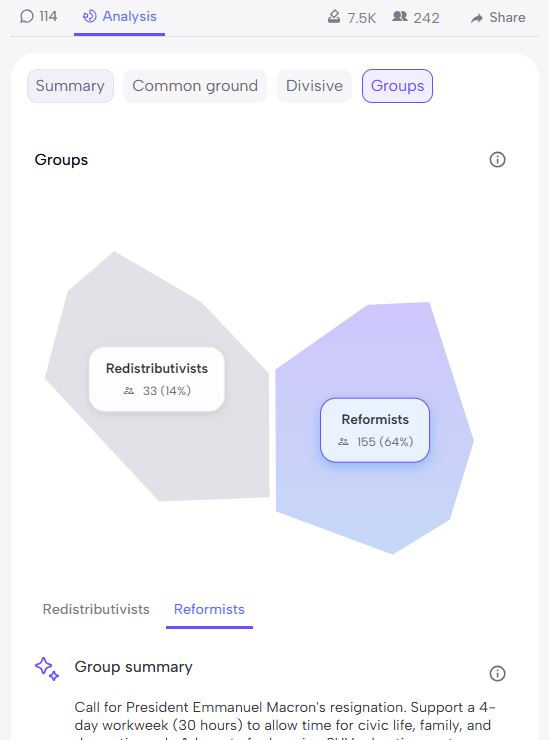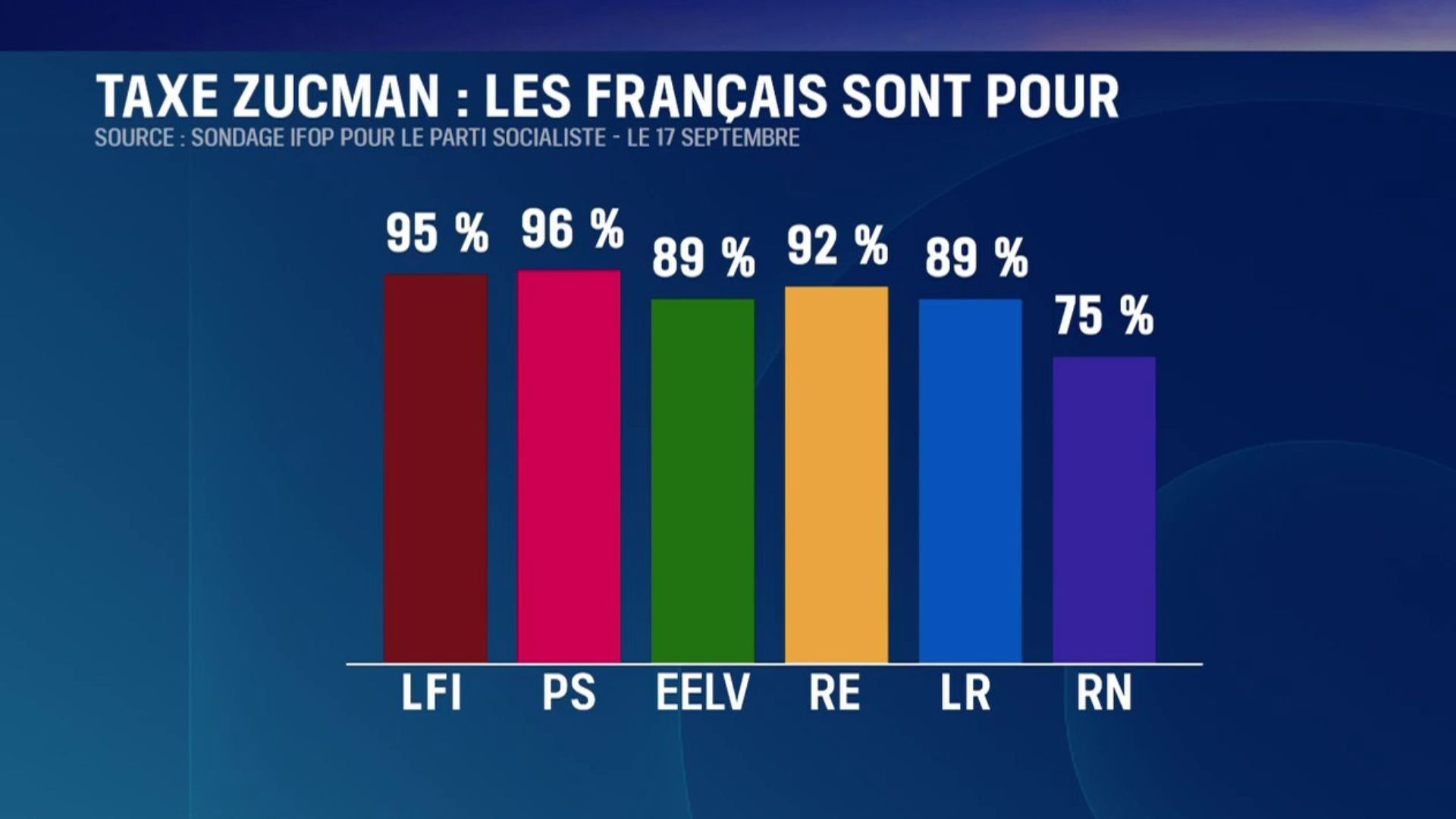In September 2025, Lyfe Catalyst, a team of facilitation and participation experts, Jean Lou Fourquet and Gaëtan Séverac, launched a national consultation on Agora Citizen Network during the strike, #bloquonstout (translated into “let’s block everything”). The initiative aimed to demonstrate that it’s possible to channel the energy of social frustration into a constructive process of consensus-building, even in a complex situation where a large part of the population is mobilized, with lots of different expectations.
The strike, announced for 10 September 2025, called for a nationwide shutdown in protest against the budget plan proposed by Prime Minister François Bayrou’s government. Yet a national poll showed that only 46% of French citizens supported the action, revealing widespread discontent, but also deep divisions about how to respond.
At a time when citizens increasingly felt unheard and divided, Lyfe Catalyst set out to answer a fundamental question: “If we block everything, what exactly do we demand, together?” The consultation, titled “#BloquonsTout: On exige quoi ENSEMBLE?”, invited participants from across the political spectrum to co-create the list of priorities that could unite rather than divide.
Designing for Collective Intelligence
Rather than relying on polls or petitions, Lyfe Catalyst used Agora Citizen Network, a civic deliberation platform designed to reveal transpartisan consensus. Unlike traditional tools that amplify polarization, Agora helps communities surface what unites them by allowing participants to react to each other’s ideas transparently and constructively.
Participants were invited to:
- Read existing proposals and vote “agree,” “disagree,” or “unsure”
- Submit new statements if their opinions weren’t yet represented
- Observe results evolve in real time through an automatically generated analysis tab
The goal wasn’t to measure support for a single issue, but to map the opinion landscape among diverse citizens and make it visible - an essential first step toward collective action.
From Mobilization to Deliberation
Although most participants came from left-leaning networks, reflecting the existing reach of Lyfe Catalyst’s facilitation community, efforts were made to include as many diverse voices as possible. The tone of the consultation was both urgent and inclusive, emphasizing unity in diversity:
“We come from everywhere, and we don’t all agree on everything. That’s normal. The goal of this consultation is precisely to find what we all agree on, because that’s how we can act together.”
Within two weeks, the Agora consultation gathered more than 7,500 votes and 114 submitted statements from 242 participants. The process was simple, transparent, and participatory, turning frustration into data-driven insight and making collective priorities visible to all.
Results: A Visible Consensus Transcending Differences
Among hundreds of proposals submitted during the consultation, several stood out as clear points of convergence - concrete priorities that transcended ideological divides:
- “The ultra-rich (the top 1% wealthiest in France) and multinational corporations must finally pay their fair share of taxes in France.”
- “Elected officials must justify their expense reports, as in any public or private organization. This is even more important for elected representatives since it involves public money.”
- “The algorithms of major platforms (TikTok, Instagram, etc.) should be audited by researchers before deployment, to ensure they do not contribute to the polarization of public debate.”
- “Introduce a fairer tax system that seeks revenue from the wealthiest rather than from the middle class (reintroducing the wealth tax, making income taxation genuinely progressive, and establishing a minimum tax rate on very high incomes).”
- “The state must reinvest massively in public services: hospitals, schools, and transport.”
These proposals formed the backbone of a transpartisan consensus centered on social justice, fairness, and institutional transparency.
Conversely, other statements revealed sharper divisions within the community, such as:
- “All members of the government must significantly reduce their salaries before asking citizens to make sacrifices.”
- “Elected officials who fail to keep their campaign promises should be subject to recall.”
- “Resignation of President Emmanuel Macron.”
- “Implementation of a universal income set at the poverty threshold (€1,200).”
- “Introduce a four-day workweek (30 hours), not just spreading 35 hours over four days, to free up time for civic life, community activities, family, and domestic work (including maintenance to reduce overconsumption).”
Agora’s analysis of the voting patterns revealed two main groups of opinion:

Opinion group analysis from the #BloquonsTout consultation on Agora
- A “Reformist” cluster (≈64%), supportive of deeper systemic change and measures such as the four-day workweek and the resignation of the President;
- A more pragmatic group, generally supportive of redistributive and fairness-oriented policies but more cautious about institutional upheaval.
Despite these differences, taxing the ultra-rich and multinational corporations emerged as the cross-group consensus, reflecting broader national sentiment. A recent IFOP poll (17 September 2025) found that 86% of French citizens support the Zucman tax: a 2% minimum levy on wealth above €100 million (around 1,800 households). High levels of support were observed across the political spectrum, from the left to the far right.

IFOP poll showing transpartisan support for the Zucman tax
A New Way to Build Democratic Legitimacy
By making consensus measurable and visible, the Agora consultation showed how structured digital deliberation can help communities escape the logic of outrage and reclaim a sense of shared purpose.
As Jean Lou wrote: “We need digital platforms that make transpartisan consensus visible and politically legitimate. Visibility and publicity of consensus can pressure politicians to move beyond party logic and act on what unites us.”
Looking Ahead
Following the “#BloquonsTout” consultation, Lyfe Catalyst plans to integrate Agora Citizen Network into future campaigns and participatory projects, continuing to explore how digital facilitation can turn citizen energy into democratic force.
For Agora, the collaboration with Lyfe Catalyst reaffirmed its mission: to help communities map disagreement, build common ground, and to give visibility and legitimacy to collective intelligence.
When people are given the right tools to deliberate, consensus is not only possible - it’s measurable, actionable, and transformative.